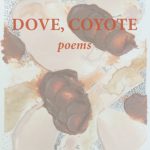 Review by Julia Lisella
Review by Julia Lisella
Laura Page is a visual artist as well as a poet, and that sensibility of the visual comes through in this collection, not so much through the imagery Page chooses, but through this poet’s faith and pleasure in the physicality of text itself, the very shapes of particular words on the page, the textures of sound. Dove, Coyote is Page’s first full length collection, winning the Ghost Peach Press Prize in Poetry in 2019, selected by Dorothea Lasky.
The poems are spare with most poems no longer than 5 or 6 lines. The collection is divided into four parts named for the seasons (and using their Latinate forms): hibernal, vernal, serotinal and autumnal, which shimmer in their alikeness of shape on the page and feel in the mouth more than their more usual counterparts, winter, spring, summer and fall, would have. That delicate and playful interplay of words that are sometimes archaic, sometimes specific and technical, continues throughout the collection as in the poem [Notch], the final poem in the “Hibernal” section, in which the suprasternal notch, a complex phrase taken right out of an anatomy textbook, becomes a deep source of pleasure where the poem, a super-short catalog of three “Erogenous zones”, lands (15).
The speaker of these poems challenges us with variations in presence, sometimes narrative, sometimes lyric. In the poem [Implied subjects] (all the poems have bracketed titles): “I read a tiny love story/on the New York Times app, a fly / repeatedly lands on my screen…” (40). In [Lilac] Page writes, “I divest many small mason jars of their lids/ imagine my heart oxidized” [23]. But at other times, she seems to be posing a riddle that only lyric can solve. In [William Blake], “I have a mind full of fleeing.” (36). Or in [Open mouth], “I come to the open mouth / of my loneliness, feeling its volition / its integrated floral engine” (3). Or in her closing poem, [A fence post forgiving], “I am a fence post forgiving / the two sides I separate” (61).
At the heart of the collection is some deep grief, never named. While in the Hibernal section, even snow blooms, in the Vernal section, grief is only a step away. In Page’s first poem to spring, [Only in spring], she notes, “As soon as the gingham of April encroaches, / the grasses say they want to grow old here. / I think only in spring / does anything want to grow old anywhere” (19).
What’s most refreshing about this collection is that it recognizes language’s impossible task to make any kind of meaning, retrieve anything genuine from our pasts, but that it does it, anyway, as in [Say blue], a kind of defiant pledge that links the beauty of language to that which it can sometimes express:
I lack occasion, now, to say
the words glaucous or sinoper, October—
say blue—
the shock of it in nature. (56)
Various phrases and images arise more than once in the collection: “Memory distorts” begins or is folded into more than one poem. “Mourning” recalls its homonym, morning, as in [Mourning dove], and religious imagery and figures emerge in these poems as well: Mary Magdalene, Jesus, angels. The overall effect of reading this collection is like sitting with a large wall-sized painting — to take it all in you have to pace back and forth down the line of the room to capture each element and phrase and shift of it. Because each poem is quite small and the bracketed titles indicate a kind of temporary or provisional quality, it would be tempting to compare these poems with miniature paintings, but such a comparison would suggest discrete units of thoughts or ideas. Instead, these poems connect and intersect and call for more than one reading. You want to relish each single poem and their inventive language, and then let the poem echo its connection to another poem from the same section or another. The dove and the coyote serve as our bookends—rivals who appear from time to time—the dove caught by the coyote, the coyote transformed.
Dove, Coyote, poems
By Laura Page
Ghost Peach Press, 2020, $16.95 paper
ISBN 978-1-7351971-0-4
Julia Lisella’s books include Always (WordTech Editions, 2014), Terrain (WordTech Editions, 2007), and a chapbook, Love Song Hiroshima (Finishing Line Press, 2004). Her poems are forthcoming or have most recently appeared in Ploughshares, Paterson Literary Review, Nimrod, Exit 7, and Ocean State Review. She writes on modernist women writers, teaches at Regis College, and co-curates the Italian American Writers Association (IAWA) Reading Series in Boston.
